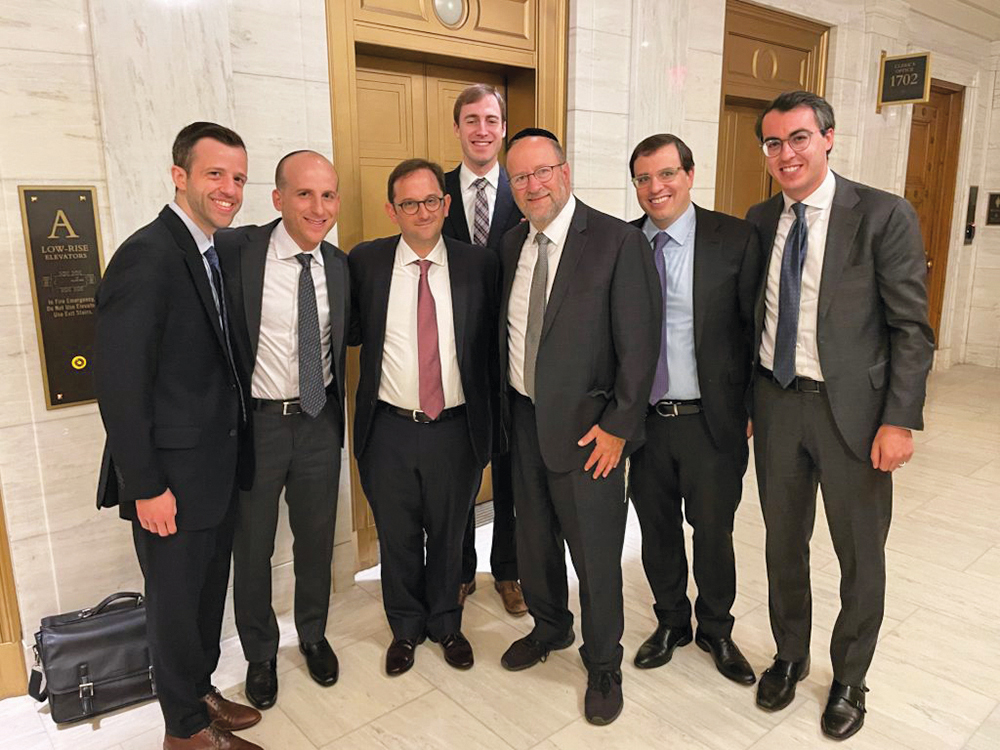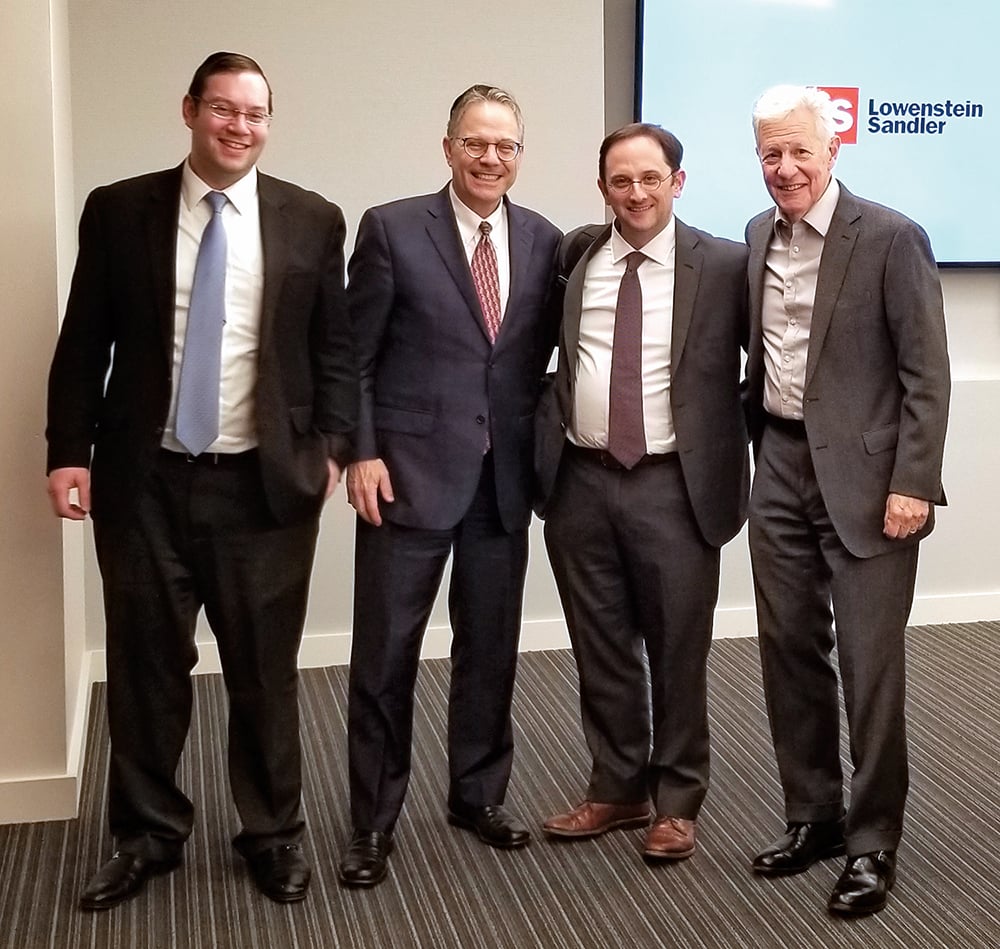
For much of the past two decades, one law firm has been synonymous with promoting and enforcing the First Amendment as it relates to the free exercise of religion, as well as religious land use, fair housing laws and civil rights statutes as they intersect with Jewish and/or religious legal advocacy.
Primarily, battles have had to be waged on city, state and federal levels to prove that the construction and maintenance of eruvin—symbolic borders often utilizing small plastic markers called lechis that allow Sabbath-observant Jews to carry on Shabbat—is protected by the First Amendment to the Constitution. Secondarily, but no less importantly, these battles have brought to light the potential liabilities for illegal discrimination in municipal planning, and the simmering presence of widespread religious intolerance in the United States, particularly as it relates to visibly Jewish communities.
That global law firm, Weil, Gotshal and Manges, LLP, has written the briefs on virtually every important case in the New York and New Jersey region related to civil discrimination against Jewish communities in this time period. And while its most well-known cases have been won in relation to eruvin, those victories were just the beginning of Weil Gotshal’s success in this arena.
Last month, Weil partner Yehudah Buchweitz, with associates Mark Pinkert, Shai Berman, Daniel Lifton and Ben Apfel, marked a legal victory on behalf of K’hal Bnei Torah of Mount Ivy (KBT), an Orthodox Jewish congregation in Haverstraw, New York, that has been seeking to build a shul since 2021. This federal land-use lawsuit was brought—after the town of Haverstraw, which initially denied the shul’s applications to build, was sued and settled with KBT—by the neighbors of the shul property, who also sought to sue the United States in federal court. The neighbors argued that the Religious Land Use and Institutionalized Persons Act (RLUIPA) is unconstitutional and charged that KBT created a public and private nuisance in their neighborhood.

(Credit: American Lawyer)
The neighbors’ initial complaint against KBT raised 16 claims for relief and sought a declaration that RLUIPA’s provision prohibiting “substantial burden[s]” on religious exercise in the land use context is unconstitutional and violates multiple provisions of the New York State Constitution. In court filings, they contended that their Jewish neighbors were a nuisance; “defendants frequently park on both sides of the street overnight” and “walk in the middle of the street in dark clothing with no reflectors in dimly lit Riverglen Drive and the surrounding streets because members of Defendant Congregation cannot operate vehicles at various times.”
To translate: “The neighbors charged that the Orthodox Jews [in this case] were creating a public and private nuisance, because of how they look,” said Buchweitz, in an interview.
The brief went on: “[T]his selfish, unlawful behavior causes a dangerous problem for school buses, emergency vehicles, garbage trucks and other normal vehicular traffic.”
Judge Cathy Seibel of the U.S. District Court for the Southern District of New York dismissed the complaint in its entirety. The court explained that the United States had sovereign immunity from the plaintiffs’ claims, and the plaintiffs had failed to establish any independent jurisdictional basis for their claims against KBT.
Dismissal of the KBT lawsuit was not the only major legal victory secured by the Weil team in recent months. This past December, the Court of Appeals for the Second Circuit handed Weil and its client, Ateres Bais Yaakov, a Jewish all-girls high school based in Rockland County, a significant victory by reversing a lower court’s decision dismissing Ateres’ land use discrimination claims. Ateres brought suit alleging that its purchase of property in the town of Clarkstown was thwarted by a conspiracy involving Clarkstown officials and a group of community members organized to prevent religious minorities from settling in Clarkstown. In reversing the lower court’s dismissal of Ateres’ suit, the Second Circuit affirmed that Ateres had a right to operate in Clarkstown and that the attempts by the municipality and others to prevent Ateres’ operation were unlawful and discriminatory.
Beginning with the landmark Tenafly, New Jersey, eruv case, which was settled back in 2006, Weil Gotshal, then with a pro bono legal team headed by Robert Sugarman—a trailblazer in this arena who retired in 2008 but has stayed active in these cases—has gotten in the trenches to fight towns and municipalities. These cases have advanced to various appellate courts, and in many more cases, have settled out of court. Since his involvement in a prominent case involving an eruv in the Hamptons, litigation partner Buchweitz has been deeply involved in the Weil Gotshal’s pro bono case work in this area, often heading up the legal team. In the Hamptons, the towns of Southampton, Westhampton Beach and Quogue all were sued to allow an eruv to be placed, and it was a protracted and public fight. It took eight years for the towns to drop their opposition and to pave the way for the Hamptons eruv.
Over much of these past 15 years, Buchweitz and his team have racked up victories for Jewish schools, shuls and even co-op residents, using a variety of laws that have become tools in its arsenal. Many of the cases involve RLUIPA, while others rely on the First Amendment and Federal Civil Rights Laws. These provided the basis for multiple rulings that lechis—which are quite literally small plastic tabs that look no different from any other tab on a telephone pole—constitute a “reasonable exercise of religion” and are therefore legal. Another law that has been relied upon by Weil Gotshal has been the Fair Housing Act, including in a 2021 case involving Fort Lee’s “The Colony” Apartment Building, which tried to prevent its elderly residents from having access to a promised Shabbos elevator.

“The Shabbos elevator cases involved the Fair Housing Act, which prohibits discrimination based on religion in housing, and requires a reasonable accommodation for handicap,” said Buchweitz, in an interview.
Buchweitz also successfully represented the Bergen Rockland Eruv Association in a nasty, antisemitism-tinged dispute involving three New Jersey communities—Mahwah, Upper Saddle River and Montvale—as they sought to halt the expansion of an eruv in Rockland County, New York.
As a result of these towns’ unsuccessful efforts, the New Jersey State Attorney General filed a nine-count lawsuit accusing Mahwah township of discrimination. All these cases were settled by 2018.
Representing Congregation Shomrei Torah of Clifton, the Weil team secured one of the largest-ever recoveries under RLUIPA, in connection with a decade-long delay and disparate treatment by the Clifton Planning Board that prevented the synagogue from construction. Under the terms of the settlement, which followed a mediation overseen by a former New Jersey State Attorney General, Clifton agreed to pay $2.5 million and construct a sidewalk adjacent to the property where the house of worship was to be built.
“The eruv cases included RLUIPA claims, but those mostly turned on the First Amendment and other federal civil rights statutes. RLUIPA is a critical tool in land-use civil rights matters but there are other tools in the toolbox for different matters. We are lucky to live in a country that lives up to its promise of religious freedom,” said Buchweitz in an interview.
However, the presence of antisemitic sentiments spelled out clearly in legal briefs leaves no doubt about the existence of long-standing Jew-hatred in America over a period of decades. Since October 7, 2023, when Hamas attacked Israel with grotesque acts of terror and barbarism, it seemed the antisemitic sentiment had two effects: It spilled into the mainstream, and Jews of all stripes suddenly became aware of it.
Has Buchweitz been surprised at the “mainstreaming” of antisemitic tropes and outright Jew-hate paraded out in the open? “I’ve been shocked, but not surprised. The cases that we’ve been involved with over the past two decades have been a sad reminder of the antisemitism that pervades our society. I can’t say whether all American Jews have woken up to the antisemitism, or have always known it was bubbling beneath the surface ready to erupt.”
“But I can say that I’ve been proud of our response to the October 7 terrorist massacre and the firm’s commitment to fighting anti-Semitism—and that’s not just [speaking for] the Jewish lawyers, but non-Jewish lawyers as well,” Buchweitz said.
“As for what can be done about it going forward, I think we all have a part to play. As lawyers, we do our best to bring our specific skills to bear, and will look for legal remedies if we can. But I think that inside and outside of our professional worlds, everyone needs to continue to speak out, while also staying positive and looking to a better future.”
What is likely most important about Weil Gotshal’s work is that by enforcing these laws and working out each case in briefs and in court (and in the media, for its part), other municipalities that might have acted in a discriminatory manner learn that these actions are illegal and are forewarned that they will be sued to the highest extent of the law if they act improperly. And with such a record, entities know what to expect if they go up against a firm like Weil that knows these laws backwards and forward.
And for the moment, this is a valuable deterrent: “For every case we brought, there are three or more that we did not but were able to prevent the discrimination from happening in private before it went too far,” said Buchweitz.









